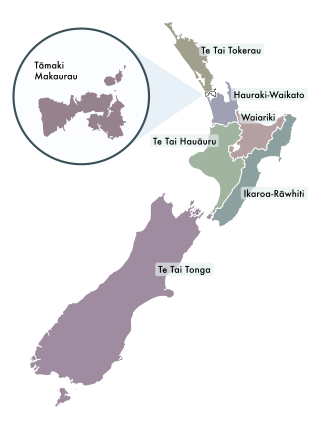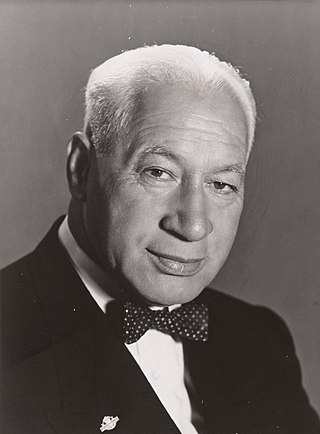Related Research Articles
Rātana is a Māori Christian church and movement, headquartered at Rātana Pā near Whanganui, New Zealand. The Rātana movement began in 1918, when Tahupōtiki Wiremu Ratana experienced visions, and began a mission of faith healing. In 1925 the Ratana Church was formed, and on 25 January 1928—T. W.'s 55th birthday, and "Rātana Day"—the church's iconic temple, Te Temepara Tapu o Ihoa was opened. From its beginning and through to the 20th century, the church has pursued political goals, and still welcomes political leaders to the Rātana Pā annually on Ratana's birthday. In the 2018 New Zealand census, 43,821 people identified with the religion.

In New Zealand politics, Māori electorates, colloquially known as the Māori seats, are a special category of electorate that give reserved positions to representatives of Māori in the New Zealand Parliament. Every area in New Zealand is covered by both a general and a Māori electorate; as of 2020, there are seven Māori electorates. Since 1967, candidates in Māori electorates have not needed to be Māori themselves, but to register as a voter in the Māori electorates people need to declare that they are of Māori descent.

The 1938 New Zealand general election was a nationwide vote to determine the shape of the New Zealand Parliament's 26th term. It resulted in the governing Labour Party being re-elected in a landslide, winning nearly 56% of the vote despite not gaining any more seats. Having replaced the United-Reform coalition, the newly founded National Party also gained a certain amount of ground.

Tini "Whetu" Marama Tirikatene-Sullivan was a New Zealand politician. She was an MP from 1967 to 1996, representing the Labour Party and was New Zealand’s first Māori woman cabinet minister. At the time of her retirement, she was the second longest-serving MP in Parliament, being in her tenth term of office. She was one of twenty holders of the Order of New Zealand, the highest honour of the country.

Māori politics is the politics of the Māori people, who were the original inhabitants of New Zealand and who are now the country's largest minority.

The 24th New Zealand Parliament was a term of the New Zealand Parliament. It opened on 23 February 1932, following the 1931 election. It was dissolved on 1 November 1935 in preparation for the 1935 election. The 24th Parliament was extended by one year because the 1935 election was held later than anticipated due to the ongoing depression, similarly the 1919, and the 1943 elections were held two years late, having been postponed during World War I and World War II respectively.

Tahupōtiki Wiremu Rātana was the founder of the Rātana religion in the early 20th century in New Zealand. He rose to prominence as a faith healer.

Sir Eruera Tihema Te Aika Tirikatene was a New Zealand Māori politician of Ngāi Tahu descent. Known in early life as Edward James Te Aika Tregerthen, he was the first Ratana Member of Parliament and was elected in a by-election for Southern Maori in June 1932 after the death of Tuiti Makitanara.

Haami Tokouru Ratana was a New Zealand politician and president of the Rātana Church. He joined Eruera Tirikatene in parliament as the second Rātana Independent Member of Parliament (MP), elected for the Western Maori electorate in 1935. Following the death of his father Tahupotiki Wiremu Ratana in 1939, Toko Ratana became the second Ratana movement president. He held both positions until his death in 1944.

Tāpihana Paraire "Dobbie" Paikea, also known as Dobson, was a New Zealand politician and Rātana morehu who won the Northern Maori electorate for Labour in 1943. He was a Māori of Te Roroa, Te Parawhau and Ngāti Whātua descent. He was elected following the death of his father Paraire Karaka Paikea who had been the MP, and he held the parliamentary seat until his own death in 1963.

Iriaka Matiu Rātana was a New Zealand politician and Rātana morehu who won the Western Maori electorate for Labour in 1949. She succeeded her husband Matiu Rātana to become the first woman to represent Māori in the New Zealand Parliament. She held the electorate until her retirement in 1969.

Te Tai Tonga is a New Zealand parliamentary Māori electorate, returning one Member of Parliament to the New Zealand House of Representatives. It was established for the 1996 general election, replacing Southern Maori. It covers all of the South Island, Stewart Island, the Chatham Islands, and parts of both Wellington City and the Hutt Valley. The current MP for Te Tai Tonga is Tākuta Ferris of Te Pā
Southern Maori was one of New Zealand's four original parliamentary Māori electorates established in 1868, along with Eastern Maori, Western Maori and Eastern Maori. In 1996, with the introduction of MMP, the Maori electorates were updated, and Southern Maori was replaced with the Te Tai Tonga and Te Puku O Te Whenua electorates.
Western Maori was one of New Zealand's four original parliamentary Māori electorates established in 1868, along with Northern Maori, Eastern Maori and Southern Maori. In 1996, with the introduction of MMP, the Maori electorates were updated, and Western Maori was replaced with the Te Tai Hauāuru and Te Puku O Te Whenua electorates.

Tuiti Makitanara, sometimes known as Sweet MacDonald, was a Māori and United Party Member of Parliament in New Zealand.
Henare Whakatau Uru was a New Zealand politician. He was the Reform Party Member of Parliament for Southern Maori from 1922 to 1928.

Rino Tirikatene is a New Zealand Labour Party politician and a former member of the House of Representatives. He comes from a family with a strong political history.
The Southern Māori by-election of 1967 was a by-election for the electorate of Southern Maori on 11 March 1967 during the 35th New Zealand Parliament. The by-election resulted from the death of the previous member Sir Eruera Tirikatene on 11 January 1967.
The 1930 Western Maori by-election was a by-election during the 23rd New Zealand Parliament. The election was held on 8 October 1930. It was held on the same day as another by-election in Waipawa.
References
- ↑ "Maori By-Election". Evening Post. Vol. CXIV, no. 30. 4 August 1932. p. 12. Retrieved 17 November 2011.
- 1 2 The General Election, 1931. Government Printer. 1932. p. 6. Retrieved 25 December 2014.